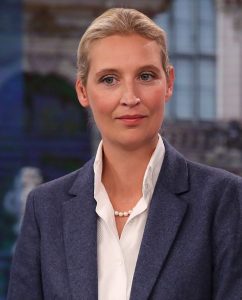
Towards the end of last year a group of far-right German political leaders gathered in a country hotel on the outskirts of Potsdam
By Tom Arms
Towards the end of last year a group of far-right German political leaders gathered in a country hotel on the outskirts of Potsdam.
They included key members of Germany’s Alternative fur Deutschland (AfD) party including the personal aide to the party leader Alice Weidel.
The AfD is currently riding high in German opinion polls. It is number one in Germany’s five eastern Lander (states) and placing second or third in several Lander in the Western half.
The meeting was organized to hear a proposal from Austrian Martin Sellner, former leader of the Identitarian Movement. Sellner has been banned from Britain and the US. His Identitarian Movement is a proscribed organization in Germany.
But the AfD politicians still wanted to hear his ideas, especially Sellner’s proposed “remigration” program. The plan was simple: Should the AfD come to power it would forcibly deport to an unnamed North African country millions of “non-assimilated peoples” and asylum seekers, even if they had German citizenship or permanent residence visas. Sellner also suggested that people who campaigned against the measure could also be deported.
The plan was simple: Should the AfD come to power it would forcibly deport to an unnamed North African country millions of “non-assimilated peoples” and asylum seekers

This is not the first time in German history that such a measure has been proposed. In June 1940 Adolf Eichmann persuaded Hitler that the SS should take over the French colony of Madagascar, turn into an SS-run police state, and deport Europe’s Jews to the island. The plan failed because of the wartime British naval blockade.
When details of the Potsdam meeting were published in the investigative journal Correctiv anti-AfD demonstrations broke out in Hamburg, Cologne, Berlin and Dusseldorf. The demonstrators demanded that the AfD be banned.
This is legally quite possible. The German constitution says that political parties “that seek to undermine or abolish the free democratic order should be deemed unconstitutional.” Advocating the forcible deportation of German citizens could be construed as undermining the democratic order.
And there is precedent for German courts banning parties. Just this week they banned the neo-Nazi party Die Heimat (The Homeland). The Identitarian Movement is also banned. It asserts the superior rights of European ethnic groups and White people in general in the territories claimed exclusively by them.
The Identiarian Movement, with which Martin Sellner is connected, also pushes the “Great Replacement” conspiracy theory. This argues that liberal elites are working towards replacing White Europeans and European culture with non-Europeans.
Another organization that has been linked with the AfD is PEGIDA (Pan Europeans against the Islamisation of the West). This organization is supported by White supremacists in America and Europe.
The AfD, Identitarian Movement and PEGIDA are all carefully monitored by Germany’s Federal Office for the Protection of the Constitution. But the AfD’s popularity, especially in the eastern half of the country makes it almost impossible to ban the party no matter how outrageous its pronouncements and policies become.
Another organization is PEGIDA (Pan Europeans against the Islamisation of the West). This organization is supported by White supremacists in America and Europe
The party was founded in 2013 and in its first federal elections failed to reach the five percent threshold required for Bundestag representation. But they quickly improved. After the 2017 elections they held 93 seats in the Bundestag and had secured representation in 14 out of the 16 Lander.
The AfD is particularly strong in East Germany. They have formed the governments in Saxony and Thuringia. Their strong showing in the territories of the former German Democratic Republic has been attributed to East Germany’s history of autocratic politics and the fact that the region continues to lag behind the rest of the country in economic terms.
The party dropped into fifth place nationally after the latest federal elections. But since then Germany has suffered a series of economic setbacks, the repercussions of the Ukraine War and a rather lack-luster Chancellor in the form of Olof Scholz. The result is that the party is now in second place in the opinion polls, ahead of the SPD and just behind the CDU-CSU.
The respected German Institute for Human Rights said the AfD was implementing “racist and right-wing extremist goals” and “shifting the limits of what can be said so that people can get used to their ethno-nationalist positions.” The Institute concluded that the AfD had reached a “degree of dangerousness” that it should be banned.
Not surprisingly, the leadership of the SPD agrees. The CDU/CSU is more circumspect. Banning established parties, they argue, is difficult. The voting public is split. 47 percent of Germans say ban them and 47 percent say don’t.
 World Review
World Review
Indian Prime Minister Narendra Modi has kicked off his election campaign with a prayer. And it was a prayer in the most controversial ethno-religious setting that he could find, thus further strengthening his ethno-religious claim to be the standard bearer of Hindu Nationalism.
The setting was the consecration of a partially-constructed Hindu temple in the town of Ayodha. It was controversial because the temple is being built on the site of a 16th century Muslim mosque which was torn down by Hindu nationalist rioters in 1992.

Related news: Ayodhya Ram Mandir: India PM Modi inaugurates Hindu temple on razed Babri mosque site
The destruction of the mosque led to nationwide religious riots which left 2,000 dead, most of them Muslims.
The Hindus tore down the mosque because they believed that it was built on the birthplace of Lord Ram, the chief deity in the Hindu pantheon of gods.
Modi made it one of his key election pledges that a Hindu temple dedicated to Lord Ram would be built on the site of the former mosque.
And to insure the maximum political return, Modi pulled out all the stops for the consecration of the temple and placed himself at center stage. For a start, the Indian Prime Minister dressed in the saffron robes of a Hindu monk and publicly fasted for five days before the consecration.
Then he invited every possible Bollywood star, businessman and politician–except Muslims and the opposition Congress I Party—to the consecration.
A military helicopter was ordered to fly overheard during the consecration ceremony showering flower petals on the crowd. Modi, of course, led the prayers.
Jawaharlal Nehru, India’s first prime minister, was immensely proud of the fact that the Indian constitution declared India a secular nation. Modi is doing his best to reverse that.
***
NATO this week launched its biggest European military manoeuvres since the end of the Cold War.
Codenamed Exercise Steadfast Defender it involves 91,000 service personnel from 31 NATO countries and Sweden. It is the first time Finland will be participating as a full member of the Alliance.
Sweden’s NATO membership was finally approved by Turkey this week and is expected to get the final nod from the Hungarian parliament next month.
Steadfast Defender is meant to demonstrate NATO—and especially American—commitment to the defense of Europe. It involves all three branches of the military—army, navy and air force—and will focus on moving troops as fast as possible into the new frontline states of Finland, Estonia, Lithuania, Latvia, Bulgaria, Greece, Poland and Slovakia.
The Russians have lodged the usual protests, but more importantly they have used their bases in Kaliningrad to jam military GPS devices in the Baltic Region.
***
Trump has won in New Hampshire. He was won in Iowa. He is expected to win in Nikki Haley’s home state of South Carolina.
The agenda for the Republican primaries is looking more and more like a rolling Trump coronation. But the pundits may be looking at the wrong agenda. They might need to spend more time examining the court calendars.
One of the several polls that was conducted during the Iowa caucus was whether the voter would vote for Donald Trump if he was convicted of a serious felony. A third of Iowans who caucused for Trump said a Trump conviction would make him unfit to be president.
If this figure were to be extrapolated nationwide then Trump would fail dismally.
There are four big cases which could result in a major felony conviction. But the odds are that for various reasons, three of them are unlikely to be heard before November. But the fourth case is the biggest and most damaging—the case brought by the Department of Justice and Special Prosecutor Jack Smith for attempted subversion of the 2020 presidential elections.
Trump’s lawyers are employing every legal trick in and out of the books to delay, delay, delay until after November when—if Trump wins—he can pardon himself.
The legal team is currently concentrating on arguing that the former president has absolute immunity for anything involving his election lie and the January 6 riots. The argument will almost certainly go all the way to the US Supreme Court.
The Supreme Court Justices could hear arguments next, month or March, unless the conservative Trump-appointed Justices seek to delay. This is unlikely given the precarious reputation of the court at the moment.
If Trump’s immunity claims are heard by March then the Supreme Court should issue its ruling by late June or early July. This gives the DC court and Judge Tanya Chutkan four months in which to schedule a trial date. Jack Smith reckons that the trial will last four to six weeks. It would be tight. Trump’s lawyers will continue to delay, delay, delay. But Donald Trump could be found guilty (or not guilty) before the Americans troop to the polls in November.
Read previous blog: Observations of an Expat: Famine
________________
 Tom Arms is foreign editor of Liberal Democrat Voice. His book “America Made in Britain” is out in paperback next month and his podcast TransAtlantic Riff may be heard by clicking here: https://open.spotify.com/show/3ntjretAKNLZNFpA5ZEGDG
Tom Arms is foreign editor of Liberal Democrat Voice. His book “America Made in Britain” is out in paperback next month and his podcast TransAtlantic Riff may be heard by clicking here: https://open.spotify.com/show/3ntjretAKNLZNFpA5ZEGDG
[…] Also read: Observations of an Expat: In a Potsdam Hotel […]
[…] Also read: Observations of an Expat: In a Potsdam Hotel […]